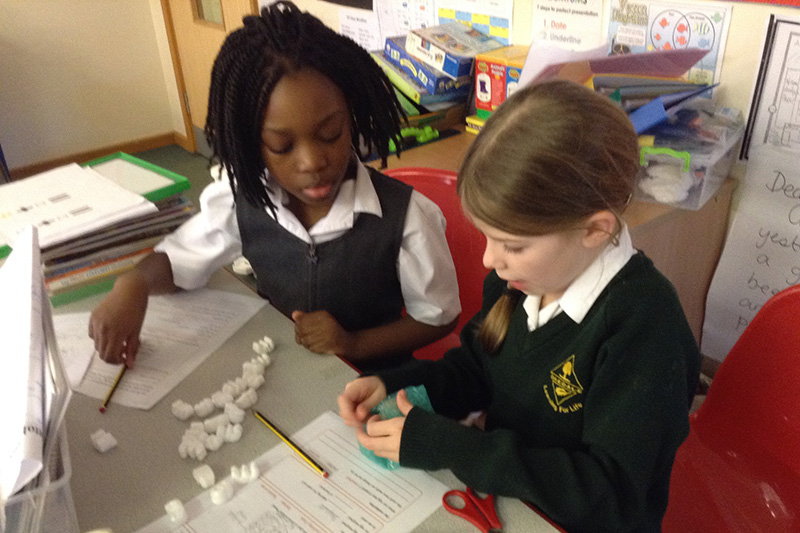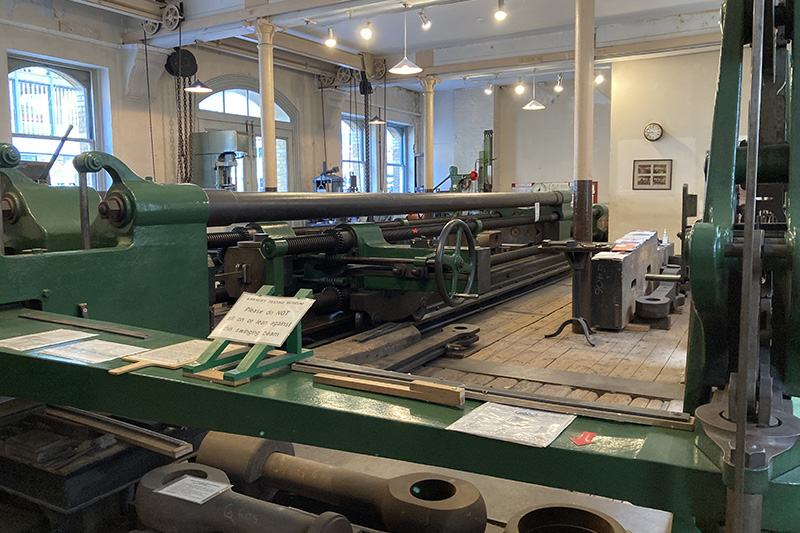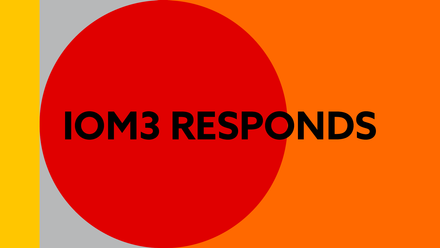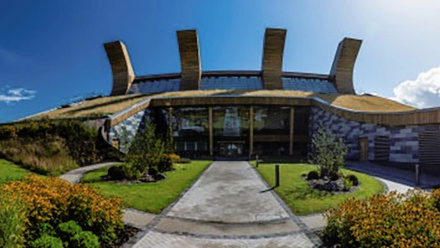Creating a spark - the impact of STEM outreach
Young people’s career goals and aspirations can be hugely impacted by STEM outreach. What is involved in curating and delivering engaging experiences?

Why do outreach at all? The consensus is it’s rewarding, fun and bluntly a matter of industry survival.
Diane Aston FIMMM, Head of Education and Professional Development at the Institute of Materials, Minerals and Mining (IOM3) says, 'The short answer is because it’s the right thing to do…If you look at the number of people that we’re going to need in materials, minerals and mining roles at all levels as we head towards net-zero and all these new green jobs that are going to be created…an awful lot of them need to be people that are well versed in materials, minerals and mining.
'Bluntly, if we don’t encourage people into the bottom of the pipeline, where are we as an organisation in 10 years’ time?'
Aston also says, “It gives you an enormous sense of satisfaction…seeing that light bulb moment come on in a child – you can’t buy that, it’s an amazing, amazing thing.'
She thinks it is also important to reinforce the teachers’ messages. 'It’s a great way of bringing the real world into what they do…because our disciplines underpin everything.'
Aston asserts, 'You have the chance to improve the STEM capital of everybody.' As well as influencing people in their career choices, it gives “experiences that kids wouldn’t otherwise have'. Aston got into the area 'back in the 1980s, when my middle school teachers were striking, I used to go back into my first school and help with the readers. I have always loved teaching!'
Then while doing her PhD, she went on to become more involved in outreach activities. 'I was a neighbourhood engineer, the forerunners to the STEM Ambassadors programme.' She says she was really 'lucky that everything aligned'.
Chris Hamlett, Discover Materials National Outreach Officer, based at the University of Birmingham, UK, says simply, 'It’s fun and it’s great seeing the smile on kids’ faces when they realise that they can do science'.
Hamlett got into outreach gradually too. At Nottingham Trent University, UK, he was asked to help with a display stand on the wettability of surfaces – his main research at the time – and 'absolutely loved it'. At the time, he was on a short-term lectureship and unable to apply for research funding, so instead he applied for some outreach funding from the Royal Society of Chemistry.
Passion also drew Hannah Higley to the field. The Future Careers Coordinator at Minerals Matter says, 'I’ve been working in various careers-based roles for over 13 years and outreach with young people is a passion of mine.
'Outreach in schools and colleges is crucial for Minerals Matter to ensure that we are promoting the sector and the variety of careers within it to young people across the country. We also need to spread the work about the minerals industry, why it exists and how important it is to our everyday lives.'
Her first such role was with East Midlands Airport from 2010-20. 'It was an element of the role that I loved, so I am very pleased to still be doing it now, just in a different sector.'
Engineer David Kirkaldy (1820-1897) developed Kirkaldy’s Testing Works to establish the scientific testing of structural building materials.
Years after closing in 1974, Dr Denis Smith, then Greater London Archaeological Society chairman, rediscovered the mothballed site and helped get it listed to recognise its importance.
A museum trust was set up in 1983. Since, volunteers have restored and maintained the machines and site for visitors. Jane Ellis MIMMM from the Testing Works, based in Southwark, London, also echoes the importance for students to see the real-world application, showing them that STEM is for everybody – it is inclusive.
Ellis got into STEM outreach very late in her career. She was a physics graduate who worked in industry as an engineer and production manager for about 20 years, and then retrained to teach Mathematics.
She retrained because she was made redundant at a senior level. She did not want to stop working in the industry, but there weren’t any suitable opportunities.
'So, for me, it was a perfect fit,' Ellis says. She was already volunteering at Kirkaldy before the education programme got underway, which she now manages. 'So it wasn’t a stretch to decide...to change direction completely.'

Curating an experience
IOM3 STEM outreach has developed over time. The Schools Affiliate Scheme was launched in 1999 and was then focused on the older end of secondary schools with a sole materials focus. It now gives all registered teachers and IOM3 members access to a range of resources to bring materials, minerals and mining engineering to life and to enrich teaching from age five upwards.
Aston notes that as classroom time is limited, 'producing resources, just because it’s an interesting topic isn’t always enough. There’s got to be a hook to the curriculum.
'It’s got to be written in an engaging way for the audience. Similarly…a presentation, it’s got to be written in language appropriate to the audience…There should be a bit of fun in it…that always helps to get the kids laughing and engaged.'
In tandem, IOM3 has been running the Magic of Materials Summer School in collaboration with St Paul School in London since 2015. The aim was for learners 'to find out more about materials beyond the confines of the school curriculum” in a less daunting environment than a university-based residential course.
'They get a chance to hear from PhD students and industrialists at the early stages of their career about how materials have changed and shaped the world…They go away absolutely fired up about the material world,' enthuses Aston.
Ellis concurs, 'Number one, is you have to make sure that the students are engaged...They must be able to make the links with what they’re doing at school. They must feel that they can ask questions, we mustn’t be intimidating.'
Kirkaldy has a workshop programme developed initially with a Physics teacher, which they thought could be made into a programme for A-level Physics students. Ellis says, 'We were very fortunate there, because they were prepared to come in and look at the equipment' and adapt it for the Physics syllabus.
'It was. I suppose, a chance encounter then that fed into what we already thought.” Pilots followed and more schools got involved.
The benefits to Kirkaldy are. 'It’s a unique selling point for us…because it’s old and historic, you can see how it works.'
Ellis muses, 'I think that our volunteers have learned that it is actually very rewarding to share their experience with younger people.' Many are retired and have largely had less contact with young people.
Making connections
Discover Materials likewise seeks to promote a career in materials science and engineering as key to improve sustainability and the performance of things around us. It is an inter-University initiative set up in 2017 by the heads of 10 materials department across the UK. They have also got an advisory board, made up of a mixture of academics, the head of an AQA exam board, and industry and community groups. IOM3 is represented on this group through Aston.
Hamlett explains, 'The heads [of department] work to increase the number of applications for undergrad courses in material science and engineering.
'One of the things we (Discover Materials) actually managed to do is work with the Universities and Colleges Admissions Service (UCAS) to get a UCAS web page set up [on materials, science and engineering].” In its first year, this received 35,000 hits.
Hamlett came on board in 2019 as National Outreach Officer funded by the Henry Royce Institute, and the initiative works with partners such as IOM3, with funding from the Royal Society of Chemistry and the UK Space Agency.
Discover Materials ambassadors are generally PhD and postdoc students, but some undergraduates and others from industry as well, who go to events at schools and science festivals. They also run career personal development sessions for teachers.
Engaging with teachers can have more of an impact than with children because you can have greater reach, Hamlett points out. For example, 'If you go to a class, you can engage with 30 kids, but if you can engage with 30 teachers, that’s about 900 kids'.
He finds people who are new to outreach, 'almost dive straight into the jargon phrases', emphasising finding common ground.
An example he gives is a presentation with different types of chocolate to see which one is toughest, which is counterintuitive and therefore educational, easy to relate to and memorable. Starting with the familiar and then expanding it.
Minerals Matter, meanwhile, is part of the Mineral Products Qualifications Council and was created to unite the mineral products sector to tackle the issues identified by the industry around recruiting and retaining people from a diverse population.
Higley says, 'In doing so, the sector will be better placed to drive innovation, increase social mobility and ensure the sector continues to play its vital role within the economy.'
They work with key education partners as well as organisations from across the minerals industry, including IOM3.
Higley adds, 'We are partnered with STEM Learning and use the STEM Ambassador programme for our volunteer recruitment. STEM Learning look after the induction and Disclosure and Barring Service (DBS) checks for volunteers, then Minerals Matter works with the ambassadors to signpost them to suitable events in schools and colleges.
'We also have resources and guidance documents available for volunteers to use to aid their outreach delivery. We work closely with careers hubs in particular regions to gain access to school and college careers events that we can link ambassadors with.'
She says this allows them to 'engage with young people on their level'. This includes “time to plan beforehand, and comprehensive instructions from the school/college to ensure that volunteers are well prepared'.
Higley reflects, 'One of the key things that I have learnt, partly from my own career journey, is that it is ok to not know what you want to do! A lot of pressure is put on young people to consider what their career will be in the future, but so many people today do not have a linear path and actually this flexibility allows for more personal growth and skill development.'
Confident communication
Aston highlights four key skills for good outreach – communication, time management, flexibility and resilience.
She adds, 'I would say you need to be confident in what you’re talking about and believe what you’re talking about 100%. Because if you don’t, the kids see through you.
'When I first started doing this, I was still quite shy…I still get nervous beforehand, particularly if it is a large group or prestigious event. Nerves aren’t a bad thing as long as the kids don’t see. I think some of that confidence comes with practice. And now I’ve spoken to well over 100,000 kids and teachers, I love standing up in front of a group and will talk to anyone that will listen!'
To respond to students questions she says, 'You’ve got to be able to think off the top of your head'. Aston has not got a teaching qualification. 'They are asking you to come in to do something above and beyond what they as educators can do. So, a teaching qualification wouldn’t necessarily help.
'I’ve always described a lot of what I’ve done as being a translator, from very high-level scientific writing into something that’s much more accessible to teachers.'
Hamlett also credits the role of storytelling. He explains, 'I found that my outreach has developed in the way that I often have to try and storify what I’m saying to try and make it resonate with the audience. 'There is the skill of actually developing an activity that’s analogous to the actual research.' Like the chocolate presentation.
Discover Materials needs writers. They encourage their ambassadors to write for their website. They also make videos.
Passion meets patience
Higley also highlights that volunteers need to bring passion to the field. 'Patience is also important as you never quite know what you are going to get when you go into a school – students could be very engaged or very bored.
'Keeping young people (particularly 12+) engaged in your content [is hard] as they can have short attention spans and will let you know if they are bored! But if you can share even just one thing that makes them think differently, then you have had an impact.'
Ellis concurs, volunteers 'must be good communicators, good listeners and good readers of the audience'.
And within the bounds of health and safety, 'You’ve got to be hands off and to ensure that it’s the students who are doing the work as far as you possibly can', Ellis emphasises. As a result, 'over 50% of what we do involves the students in either operating the equipment, making measurements and making note'.
'You want to include everybody.' You also need to make sure certain students do not dominate, Ellis says.
Giving back, getting back
The voluntary nature of the work is a challenge that both Hamlett and Ellis highlight. Hamlett laments, 'We’ve done a few online sessions that we’ve advertised but nobody turned up.'
Ellis adds, 'The challenge is, how do I manage increasing demand with limited resources?' They want to expand the workshop programme but need more volunteers to do this.
And then there is the challenge of finding volunteers who have the right skillset and are also available during the week.
But there is professional benefit to ‘giving back’ also, in terms of developing communication, presentation and mentoring skills – in addition to confidence. Hamlett says, 'Those skills are transferable to a lot of different careers.'
'Communication skills are something that you’ll develop in spades,' Aston adds. 'STEM outreach [also] offers you the flexibility to be able to dip in and out of whatever level you want. School audiences can be challenging…you really have to think on your feet…So in terms of developing presentation skills, it’s probably a bit of a baptism of fire.'
She asserts, 'If you can present to a group of grumpy 13-year-olds, you can present to anyone.
'And it’s also a nice way of fulfilling some of the competencies if you are working towards professional registration,' she concludes.
Hamlett observes that often their ambassadors want to stay in academia and outreach experience is invaluable for a research grant application.
He adds, confidence will be developed as new ambassadors can be nervous. Yet, 'once they’ve delivered an activity and had a bit of mentoring, a lot of them just absolutely love it'. To, in turn, inspire others. 'It has helped me understand the education landscape, not only in my role but also when considering my children and their experiences at school,' Higley notes.
'There is always value in thinking about how to explain what you’re doing, and why you’re doing it to somebody who’s not an expert…And to think, why do we do this?…And interpreting that for somebody else. It really does encourage deeper thought and reflection about your everyday tasks,' Ellis shares.
Breaking the ice
Like the idea of inspiring others and giving something back? Our contributors have ideas and encouragement for getting started.
'My first suggestion would always be, get yourself signed up with STEM Ambassador…They will give you some very basic training on working in school and they will provide you with opportunities to go and engage in schools…think about who exactly it is that you are comfortable to engage with. And that might change over time…Look for local opportunities to get involved,' Aston advises.
Higley agrees, 'Take your time to find the right opportunity or event for you and reach out for support if you need help in developing content or activities. There are a lot of organisations out there who offer support for outreach, including Minerals Matter, STEM Learning, Engineering UK, Careers Hubs and School Outreach.'
Ellis suggests to 'start small'. See if you can find a local school and put together a proposal for the right people in the school to review, again you may need to research this. 'But don’t guess…you really need the input from the teachers to find ways in which you can map that onto the curriculum'.
She feels it’s important to break down those walls between school and teachers, and engineers and scientists. 'The teacher’s idea about what goes on in industry is often exceedingly limited.' Adding, teachers rarely make the first move.
Hamlett wants to encourage people to take up outreach opportunities and to connect with people in industry. Adding if 'there’s companies out there who’ve got some really good outreach activities already who want to help developing something more, amplifying it, then please get in touch.'
Ellis also stresses, 'We’d be happy to hear from your members. Please get in touch.' Aston enthuses, 'It’s the most rewarding thing that you can do. To go and give something back. So just do it. It’s amazing. It really is amazing.'







